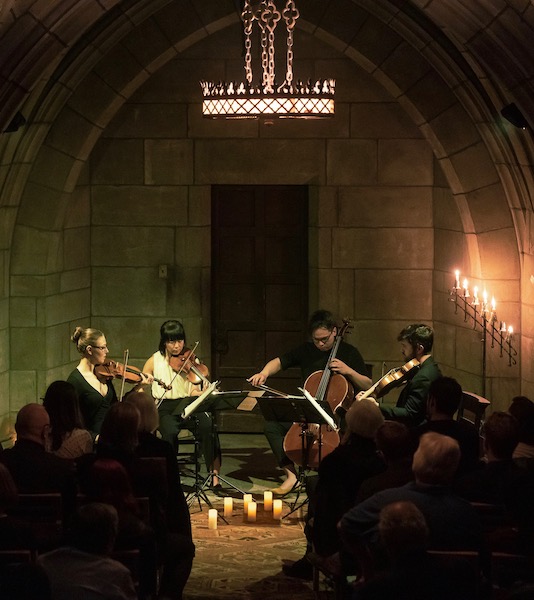Attacca Quartet digs deep in music of Caroline Shaw

The Attacca Quartet performed music of Caroline Shaw Tuesday night in the crypt of the Church of the Intercession. Photo: Steven Pisano
Classical music is an old art form with a not unrelated concert convention of sticking with older repertoire and musicians.
But there’s always a new generation coming along, and this century so far has seen a rise in movements from young composers, hand-in-hand with the development of accomplished young ensembles. Those two trends came together with generous rewards Tuesday night, when the Attacca Quartet played music by Caroline Shaw.
The Attacca is one of the seeming dozens of excellent young string quartets that are increasingly dominating the performing scene. Like peers such as JACK Quartet and the Dover Quartet, they have a gorgeous, resonant sound and exceptional ensemble intonation and articulation. This was their third appearance in the excellent Crypt Sessions series, with concerts held in the crypt underneath the Church of the Intercession.
The occasion was an informal release party for the group’s new recording, Caroline Shaw: Orange, a collection of string music by Shaw, released last month by Nonesuch Records. The composer, who won the Pulitzer Prize in 2013 for her vocal Partita, is one of the cohort of post-post-minimalists, musicians who follow the lessons of the second-generation minimalists, like the Bang on a Can composers.
Her style is made out of consonance and short phrases which are repeated with displacement and small alterations—a note added or a duration extended, like Stravinsky but with a focus on lyricism rather than pulse. Shaw has excellent craft and is artful at pushing her materials around, turning things inside out and upside down. Her string music communicates deep feelings about the act of composing, the joy of hearing an ineffable structure spin itself out through time, the pleasure of perfect intervals.
She also expresses a love for the music that has come before her and is in the foundation on which she stands. Plan & Elevation is a five-movement piece that is organized around her own experience at Dumbarton Oaks in Washington, D. C. There is a delight for the listener in recognizing fragments of Ravel, Debussy, and Mozart, and the quartet’s performance was superb, the music coming through with a physical, affecting passion.
But the few weak moments in the pieces were also tied to the use of history. Shaw’s distinctive voice, soulful and urgent and vital, stands with impact in relationship to the past. But the music of other composers, especially that of Beethoven in Blueprint, is not always well-integrated into the works as a whole.
There were disappointing moments—fleeting to be sure—in Plan & Elevation when Shaw abandoned her own, strong line for a glance backward. This was more acute in Blueprint, despite Attacca’s consistently excellent playing the only problematic piece on the program. In it, Shaw relies too much on quotes from Beethoven’s string Quartet, Op. 18, no. 6—not only is Beethoven a tough act to follow, but the music seems to exist only as a frame in which to put his genius on display.
But one welcomed Shaw’smore expansive ear, the cadences and strumming in Punctum and the wonderful Entr’acte that stand on their own while celebrating the pleasures of William Lawes or John Dowland.
Her Ritornello, with its combination of delicate poise and striding energy, makes rich and powerful usage of an ancient idea, and the playing Tuesday brought out a complex feeling of appreciation and melancholy.
Attacca finished with the rousing Valencia, which cellist Andrew Yee said was “about an orange.” The quartet’s dedication and love for this music shined all the way through to the last note of this memorable concert.
One was left with the feeling that the only drawback was an all-Shaw program might have been too much of a good thing. Played all the way through, the experience was so strong that this was the rare case where an intermission to refresh the senses might have been welcome. But such a thought reinforces the overall excellence of the evening.
Clarinetist Sam Boutris and colleagues play the Mozart and Brahms Clarinet Quintets 7 p.m., May 14, in the crypt of the Church of the Intercession deathofclassical.com





